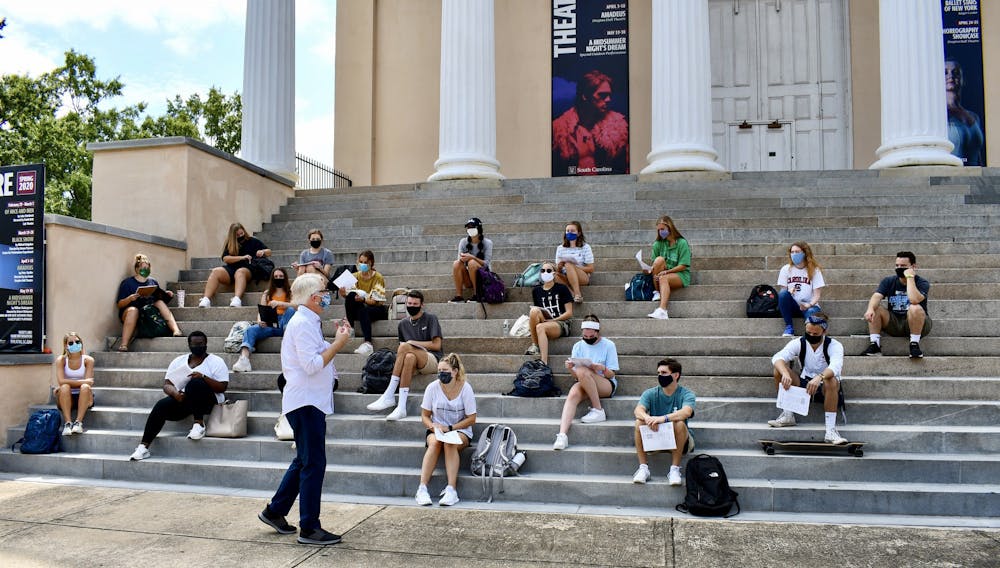The fall semester has begun, and the unconventional past two weeks have shown that the community is hungry: hungry for people.
Whether classes are online, in-person or both, the efforts behind such a transformative educational environment come from the hearts of teachers, who are putting students first and reminding them they’re in this alongside each other.
Dean of the College of Arts and Sciences Lacy Ford said that in order to gain perspective of the "quality of life" on campus and understand students' class experiences he uses “cautious pragmatic optimism” in the classroom.
“One reason I wanted to go ahead and teach a face-to-face class is to, sort of, show that I believe those environments certainly could be made as safe as possible,” Ford said.
James Ackley, professor of the trumpet, said that because classes are taking a different turn in how they are delivered, he was prompted to take initiative over the summer to get music students the equipment they needed for a quality education online.
Consider how each curriculum affects each instructor differently, similar to students' unique college experiences.
"That's a key thing, is you have to approach all of this with a generosity towards other people and trust that they are doing the best that they can," Jerry Mitchell, department chair in the Department of Geography, said. “You can’t right now say, 'That’s not my job.'"
With pressure to go above and beyond for the students while taking care of one another, the question is whether resources are there for a successful semester.
“We’ve got plans A, B and C, and so that means we’re doing triple the work,” said Bridget Armstrong, an assistant professor in the Department of Exercise Science.
Nina Brook, an instructor in the School of Journalism and Mass Communications, said she is determined to help students get the content they need in order to keep making progress on their degrees.
The transfer of knowledge and communication through a mask or webcam is a form of technoculture the community is learning every day.
Adjunct professor of chemistry in the Honors College Way Fountain said he thinks "artificial realities" hinder discussion and that the online format "impedes the free flow of discussions and ideas."
Armstrong said she's lucky she has been able to engage with students and steer away from a passive experience in the classroom.
“I hope that the energy and sort of the enthusiasm that we started out with can persist,” Armstrong said.
Pride in community interaction beyond instructional means is a sentiment shared among this group of employees.
Mitchell said he enjoys a first-name basis with his students, and right now, only seeing people's eyes is making that hard. In a virtual setting, some professors express concern in the ability to connect.
Ford got the chance to walk and talk with one of his students, which showed him that it is possible to have safe, direct conversations that the students are interested in.
"We both kind of realized, 'Hey. Normally I'd be walking with a group of students and you'd say hi and we'd say hi and we'd move on,'" Ford said.
Even collaborative interaction on campus is considered a risk to many. Given the challenges, the staff has prevailed in approaching a more state-of-the-art online learning practice.
"A lot of us, we really love what we do. And it's feeding off of each other, and it's feeding off of the students that are here, and we all want that back," Mitchell said.
Though there has been a learning curve through this educational trial, the staff has found many positives.
Armstrong said it is “soul nourishing” to see the students and she "cherishes" infrequent socially distanced co-worker collaboration and researching with new doctoral students.
“It is so lovely to be back on campus and see people in 3D. I wasn’t sure that people had the bottom half of their bodies anymore,” Armstrong said.
Rethinking social interaction includes rethinking personal assessment. Ford said hybrid classes give students an advantage and, moving forward, should be incorporated more.
“How do we properly assess a student's knowledge? How do we make it fair, and then how do we keep it refreshed?” Fountain said, referring to the recycling of online testing material. "The faculty is working hard to reformat teaching for a unique experience."
Online education won’t be a thing of the past, and neither will the Carolina community that continues to support one another.
“Even though I’m at home, I’m supported by the campus,” Brook said. “We are really on the shoulders of the people that are keeping the university open.”
In the midst of COVID, the educational purpose has shifted, and Carolina employees' mission to deliver an experience for the students has adapted. Perfection isn't in the equation, only recognition.

